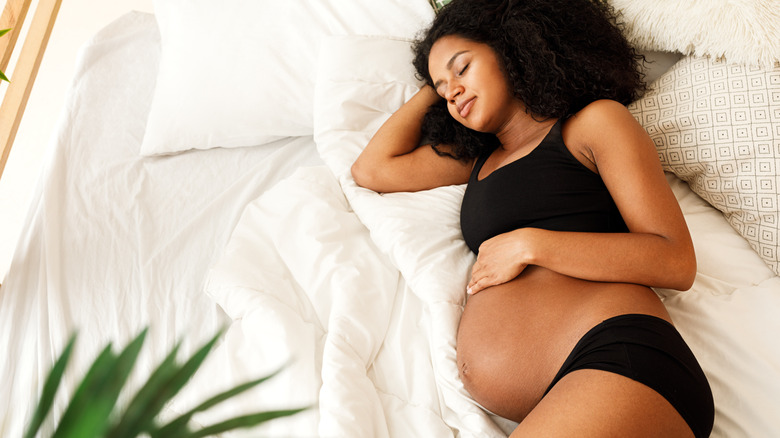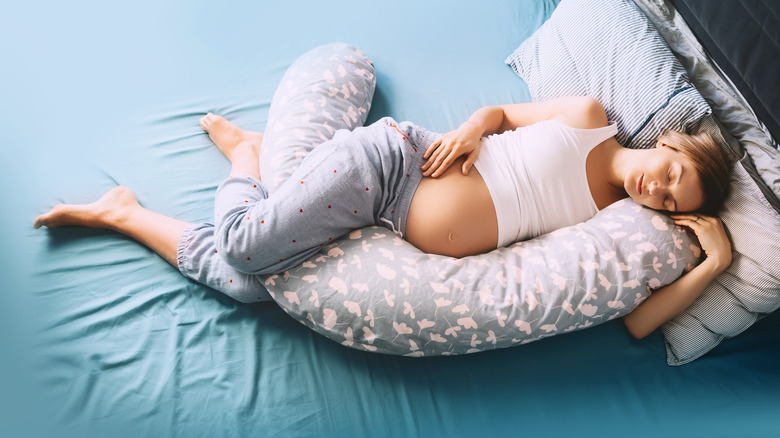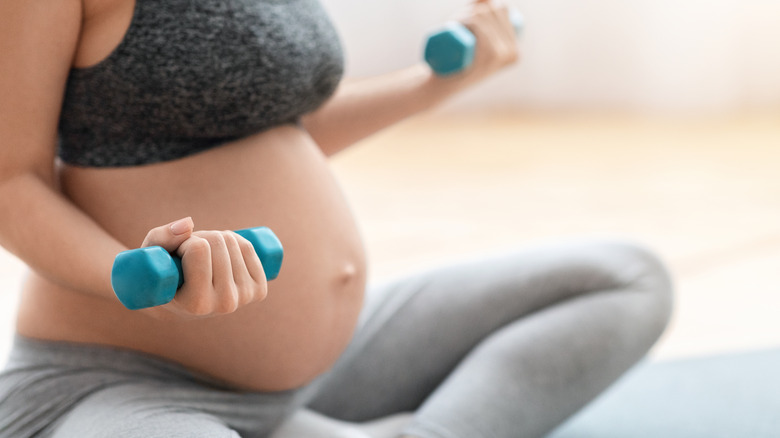What Are The Best Positions To Sleep In While Pregnant?
Sleeping well during pregnancy can be a challenge due to many factors. In fact, SleepFoundation.org reports that 50% of pregnant women struggle to get a decent night's rest. Healthline points out that some of the common causes of pregnancy-related insomnia include morning sickness symptoms, which don't just take place in the morning, restless legs, heartburn, and the increased need to use the bathroom. Additionally, pregnancy can be a time full of anxieties around the developing fetus, the upcoming birth, the transition to parenthood, and much more. The racing thoughts definitely put a damper on sleep.
Another issue that comes up during pregnancy surrounds how to position the body during sleep. If you're currently pregnant, you may have heard the warning that sleeping on your back is a big no-no once you hit the middle of the second trimester or around 20 weeks, as per Cleveland Clinic. There's an important reason for this, which OB-GYN Salena Zanotti explains has to do with the inferior vena cava — a large vein that runs right down your back and brings deoxygenated blood back to the heart. "So the thought is if you have anything large that's pushing against the blood flow return, you'll have less blood flow to your heart," Dr. Zanotti states, adding, "That means you'll have less blood flow to yourself and the baby."
So if sleeping on your back is out, what positions are not only safe to sleep in but will also optimize your chances for decent shut-eye?
Try these positions for a good night's rest
Logically, back sleeping is frowned upon and stomach sleeping is also not ideal because the extended abdomen makes this position incredibly uncomfortable later on in pregnancy, per Medical News Today. So you're left with sleeping on your side during pregnancy, according to the American Pregnancy Association. This works out for the best because side-sleeping is the ideal position for blood flow throughout the body, which not only provides your growing baby with the oxygen and nutrients they need to develop properly, but it also reduces any swelling and varicose veins that tend to occur during pregnancy.
For even better circulation, it's best to sleep on your left side with your knees bent and a pillow both under your belly and between your legs for added support. Nowadays, you can also find specially designed pregnancy pillows in various shapes and sizes for optimal support as you sleep, as per What to Expect.
As well, you may need to adjust your sleeping position depending on the symptoms you're experiencing at any given point during the pregnancy. For example, the NHS advises anyone suffering from heartburn, another common symptom of pregnancy, to sleep with the head and shoulders slightly raised to prevent food and stomach acid from coming back up. Keeping yourself in a semi-upright position with the creative use of pillows is also a great solution if you're dealing with shortness of breath (via the American Pregnancy Association).
How to maximize your quality of sleep when pregnant
In addition to ensuring you're sleeping in the right position for your stage of pregnancy and any symptoms you may be experiencing, there are plenty of other ways to keep that pregnancy insomnia at bay. Healthline encourages pregnant individuals to focus on cultivating good sleep habits, including a regular routine, to help with this problem. Prior to hitting the sack, ensure you're giving yourself enough time to unwind from the day and engage in a relaxing activity that doesn't involve screens. This is because research has shown that the blue light from electronic devices interferes with the brain's ability to produce melatonin, an important-sleep inducing hormone, as per WebMD.
The American Pregnancy Association suggests a warm bath or shower and a pre-bed massage as optimal relaxation techniques to prepare your brain and body for sleep. Reading a book before bed can also help nudge you into dreamland. In fact, a 2021 study found that when participants read before going to sleep, 42% of them reported improved sleep. This could be due to the stress-relieving effect of reading, explains WebMD.
The NHS adds that avoiding caffeine too late in the day is good practice for ensuring your body winds down in time for bed. Finally, if you feel up for it and have been cleared by your doctor, fitting in some pregnancy-approved exercise during the day can also go a long way in preventing sleep disturbances, according to a 2018 study.



